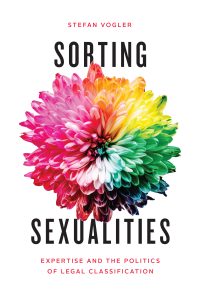9 Questions with Stefan Vogler, author of “Sorting Sexualities”
In his new book, Stefan Vogler deftly unpacks the politics of the techno-legal classification of sexuality in the United States. His study focuses specifically on state classification practices around LGBTQ people seeking asylum in the United States and sexual offenders being evaluated for carceral placement—two situations where state actors must determine individuals’ sexualities. Though these legal settings are diametrically opposed—one a punitive assessment, the other a protective one—they present the same question: how do we know someone’s sexuality? We asked him a few questions about it.
Your book concerns the techno-legal classification of sexuality. For the unfamiliar, what does that mean?
By “techno-legal classification” I mean the ways that law, science, and technology come together to make decisions about how to classify and categorize sexual subjects. We often think we know what sexuality is because of common sense—the old “I know it when I see it” idea. However, what I show in the book is that what “sexuality” means actually varies across institutional contexts, and that variation is often at least partially attributable to the kinds of knowledge or expertise that inform that area of law. A biological understanding of sexuality generally means that one believes we can find the “cause” of sexuality—whether it is homosexuality, pedophilia, or otherwise—in the brains, genes, or hormones of people. Conversely, a sociological or anthropological understanding of sexuality assumes that sexuality is the product of complex social and historical processes that delineate sexual expressions. These aren’t necessarily incompatible views, but when only one of those views informs the law, that view is the one that will be codified in law and be used to classify people’s sexualities. I show how these “techno-legal classification” practices operate to very different ends in LGBTQ asylum law and sex offender law in Sorting Sexualities.
What initially drew you to the topic?
Ever since I was a baby academic I have been interested in the relationship between state power and sexuality. When I began volunteering for a nonprofit that offered legal services to LGBTQ people, I learned that LGBTQ people could seek asylum because of their sexual identities. But I also learned that a key part of those claims involved having to prove one’s sexuality in court, and I just thought, well, how does someone actually do that? What do courts consider proof of someone’s sexuality? It felt like the perfect place to explore my long-standing interest in the relationship between sexuality and the state because the state is literally saying to people, “Yes you’re gay,” or “No, we don’t believe you’re gay,” and basing life and death decisions off of that. Soon I came across other areas of law where similar processes were happening, including in sex offender civil commitment trials, which became my comparison case, in part because of the long historical relationship between gayness and sexual criminality. The comparison allowed me to explore how criminalization and medicalization affected conceptions of sexuality.
How does your book change how we ordinarily think about state power and sexuality?
I think most people don’t realize the extent to which sexuality serves as a vector of state power beyond things like marriage. My goal with the book was to show that sexuality is hugely consequential as a way of exercising state power and creating forms of social control. Sexuality is so multivalent (is it a behavior? an identity? a desire?) that it can take on drastically different valences and meanings depending on a range of social, political, and institutional factors. This allows state institutions to deploy sexuality to probe more deeply into individual bodies and desires as well as expand more widely over new areas of social life. In the book, I argue that we should think of sexuality as a social technology because of the many things that can be done with and through sexuality. My cases begin to illustrate that argument. In the case of asylum law, sexuality becomes a means of inclusion for some sexual minorities and is used to regulate flows of migrants in an apparently benevolent act of state power. In the case of sex offender civil commitment, sexuality is a way of permanently criminalizing an individual and expanding the reach of the carceral state. And these are just a few examples. Sexuality can be used to sort people, order lives, extract labor, partition space, create subject positions, and so much more.
Did you make any unexpected discoveries in your research?
So many, beginning with discovering that both LGBTQ asylum and sex offender civil commitment laws existed at all! Perhaps one of the standouts was learning about a technology called the penile plethysmograph or PPG. The PPG is essentially a blood pressure cuff that is placed around a man’s penis to gauge his arousal in response to different kinds of sexual stimuli (e.g., sexual audio vignettes or audio-visual pornography). It is regularly used to assess sex offenders both in custody and in the community despite a very sketchy scientific track record. (I’ll readily admit that I’m dubious about the PPG, not least because of its assumption that something as complex as sexuality can be assessed by the extent of one’s erection.) It’s not unlike the polygraph, or “lie detector,” which is not accepted as evidence in court most of the time. Neither is the PPG and yet it wields immense influence in legal decision-making around sex offenders in so many ways. I know sex offenders are not necessarily an especially sympathetic bunch, but I think we all need to be concerned when dubious technologies and knowledge are informing important legal and political decisions.
Where will your research and writing take you next?
My research continues to move me toward a greater understanding of the relationship between sexuality and the state. My current project is seeking to understand the vast over-representation of LGBTQ people in jails and prisons. Sexual and gender minorities (SGMs) are three times more likely to be incarcerated than the general population, but we don’t really know why. We do know that SGMs have a very contentious history with the police and that SGMs continue to report discrimination by law enforcement. But I don’t think that’s the full picture. I strongly suspect that sexuality structures criminality in ways that we still don’t fully understand.

Stefan Vogler is a research scientist with NORC at the University of Chicago and an affiliated scholar with the American Bar Foundation. His work has been published in numerous journals, including Gender & Society, Theoretical Criminology, Sociology Compass, Law & Society Review, and the Journal of Homosexuality.
Sorting Sexualities is available now on our website or from other booksellers.
